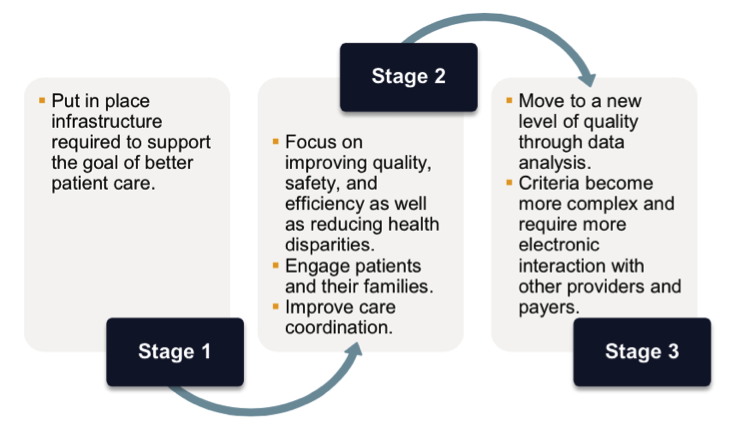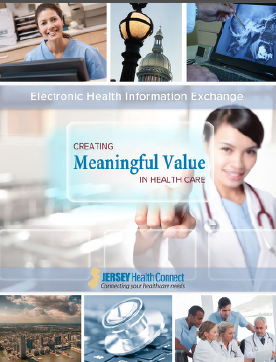New Legislation to Transform Medicare
Meaningful Use… It’s Not over yet!
Andy Slavitt, Acting Administrator of CMS, recently stated that “the Meaningful Use program will be ending in 2016,” causing much confusion among providers. Slavitt went on to say that “the program would transition to the Medicare Access & CHIP Reauthorization Act of 2015″ (MACRA) which defines metrics, (including Meaningful Use) as a means to calculate CMS incentives or penalties.
Understanding The Medicare Access & CHIP Reauthorization Act (MACRA)
As the healthcare landscape continues to rapidly change, it is becoming increasingly more important to keep pace with the many and most significant catalysts behind that change. The Health Information Technology community has been anxiously awaiting Meaningful Use (MU) updates and clarification on Stages 2 and 3. When released in October 2015, there was a flurry of activity to review and comprehend the new information. The Meaningful Use information is important for hospitals and physicians as it defines the requirements for collecting incentive payments that were made available through the American Recovery and Reinvestment Act of 2009.
A much more ‘impactful’ healthcare law passed in 2015 (that will bring significant change)…is the Medicare Access & CHIP Reauthorization Act of 2015 (MACRA), which defines future payment reforms and structures for Medicare & Medicaid. MACRA consolidates some familiar incentive programs; Merit-Based payment programs like PQRS (Physician Quality Reporting System), Alternative Payment Models (such as ACOs and Patient Centered Medical Homes) and Meaningful Use, into a single program. The law also includes a two-year extension of the Children’s Health Insurance Program (CHIP) as part of the legislation.
So what does all this mean for Jersey Health Connect and its members? It means that IT-centered healthcare initiatives are being hard-wired into the payment structures of our industries largest payers: Medicare & Medicaid. We are already seeing commercial insurers following the trend with risk-based payment models. Since many of the most significant MACRA payment changes are scheduled for 2018, JHC will work through 2016 to ensure that appropriate infrastructure is in place in the HIE to collect, store, and analyze health data to support quality reporting, optimize efficient delivery of services and utilize healthcare analytics to support the new paradigms.
Learn more about MACRA at:
https://www.cms.gov/Medicare/Quality-Initiatives-Patient-Assessment-Instruments/Value-Based-Programs/MACRA-MIPS-and-APMs/MACRA-MIPS-and-APMs.html
Achieving EHR Incentive Program Goals
Using the Health Information Exchange to advance EHR technology for health and efficiency goals under Meaningful Use stages.
CMS is providing incentive payments to eligible providers and hospitals that adopt, implement, upgrade or demonstrate Meaningful Use of certified electronic health record (EHR) technology. JHC continues to support its members as they move from creating health information in Stage 1, to securely exchanging information in Stage 2, to understanding the new requirements for Stage 3.
In 2013, the Centers for Medicare & Medicaid Services (CMS) announced a new timeline for the implementation of Meaningful Use where:
- Stage 2 was extended through 2016
- Stage 3 will begin in 2017 (for providers who have completed at least two years in Stage 2)
Jersey Health Connect members across New Jersey are using our suite of products and technologies to meet and exceed the requirements of Meaningful Use stages.
Meaningful Use of Interoperable Health Information
The American Recovery and Reinvestment Act of 2009 (ARRA) was enacted on February 17, 2009. As part of ARRA, the Centers for Medicare & Medicaid Services was tasked to create the EHR Incentive Program, also known as Meaningful Use. The program established incentive payments to eligible professionals (EPs), eligible hospitals, and critical access hospitals (CAHs), and Medicare Advantage Organizations to promote the adoption and meaningful use of interoperable health information technology (HIT) and qualified electronic health records (EHRs). The program’s goals are part of broader effort under the HITECH Act to accelerate the adoption of HIT and utilization of qualified EHRs & Health IT.
Quality metrics are integral to the Meaningful Use requirements outlined by the Center for Medicare and Medicaid Services. While the Meaningful Use Incentive Program provides financial rewards for EHR implementation, the ultimate intent of the program is to improve the quality of healthcare. To remain eligible for Medicare or Medicaid incentive payments, eligible professionals must navigate the complexities of achieving Meaningful Use of certified EHR technology and know how to prepare for attestation and a possible audit by the Centers for Medicare & Medicaid Services (CMS). Once attained, sustaining meaningful use requires a long-term commitment to behavior and workflow changes, as well as robust monitoring and training programs. Health Information Exchange organizations – like Jersey Health Connect – provide the services needed to support fulfillment of many Meaningful Use requirements focused on the sharing of information and attestation.
Achieving meaningful use for EHRs is a three-stage process. With each stage, providers move toward expanding data sharing, documenting the coordination of care delivery, enhancing the management of disease, and improving the quality of care outcomes.
Achievement is determined based on core objectives and menu objectives, some of which require a yes-or-no attestation and others that are measured based on the percentage of patients who meet specified criteria. For specific descriptions of each of the core and menu objectives, visit the CMS website at www.cms.gov/ EHRIncentivePrograms. In each stage, the threshold for meeting criteria is raised. Stage one focused primarily on gathering and recording the necessary patient information, stage two focused on using the EHRs in a meaningful way, and stage three will focus on using the data to improve outcomes.

EMR Partners
JHC is making healthcare interoperability a reality. Our comprehensive enterprise solution provides the services, architecture, platform, and user experience that eliminate barriers between disparate data sources with a vendor-neutral platform that allows JHC members to participate and benefit from the HIE – regardless of their EMR vendor. JHC is currently working with over 40 of the largest EMR vendors in the open model – offering tremendous flexibility to members.
Jersey Health Connect EMR Connections:


